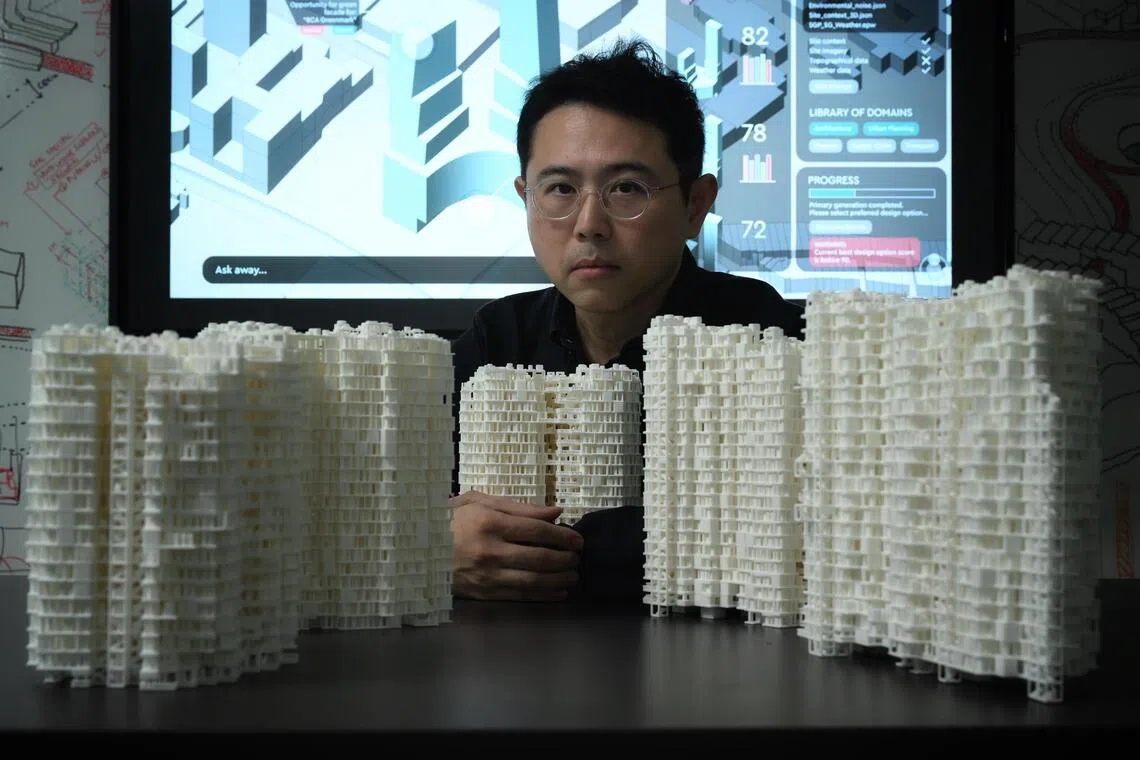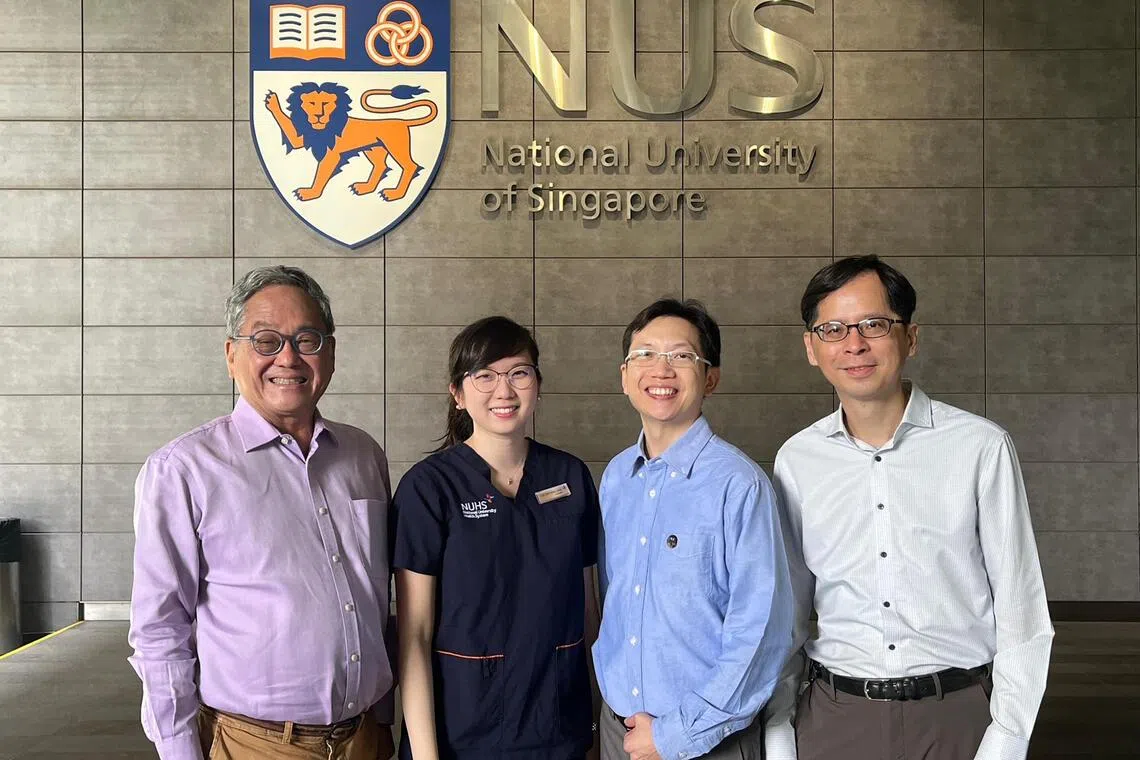Ditch that device. Go off-grid to boost brain health
Sign up now: Get ST's newsletters delivered to your inbox

Experts are warning against lifestyles that lean heavily towards passive consumption of digital content instead of good old-fashioned reading of newspapers, magazines and books.
ST PHOTO: KUA CHEE SIONG
- Digital overload and passive screen time may harm cognitive function, unlike reading physical books. Studies reveal screen time inhibits recall.
- Early reading improves cognitive skills, academic performance and mental well-being in teens.
- New AI-powered retinal scans can predict cognitive decline up to five years in advance.
AI generated
SINGAPORE – From chatbots that spit out essays in seconds to smartphones that serve up answers at your fingertips, artificial intelligence (AI) and mobile devices have become the go-to tools for instant gratification. But relying on machines to do the thinking may come with hidden costs to brain health, according to recent studies.
Experts, both here and overseas, are warning against lifestyles that lean heavily towards passive consumption of digital content instead of good old-fashioned reading of newspapers, magazines and books.
Not even e-books make the cut, doctors say. Turning the pages of a printed book instead of swiping screens is an antidote for digital overload.
These experts note that the focused attention needed to understand the plots, vocabulary, characters and sub-text in a physical book activates multiple regions of the brain.
This is at odds with watching video feeds on smartphones or doomscrolling, which provide fleeting dopamine surges but inhibit recall as the brain is entertained but not challenged.
Experts here are also concerned about the rise of Asian dementia.
In an ongoing research study of 818 Singapore participants, aged 30 to 95, about half were found to have undiagnosed mild cognitive impairment (MCI), a brain condition that points to the early stages of dementia.
The sobering data was reported in June 2023 by a team of scientists at the Dementia Research Centre (Singapore), housed at the Lee Kong Chian School of Medicine at Nanyang Technological University.
The research study has been expanded to 1,500 participants to continue to look at what happens to the brain at the earliest stages of dementia and even before brain changes set in.
MCI is a collection of symptoms that includes age-related cognitive changes and abnormal mental decline from a serious illness of the brain, such as Alzheimer’s disease.
Risk of mental decline caused by digital overload
In Europe, multiple studies done by research units of institutions such as Cambridge University in Britain and the World Economic Forum (WEF) in Geneva, Switzerland, show that a disciplined lifestyle that strikes a balance between digital device usage and the inclusion of tactile experiences – such as book reading, crafting and creating artworks – helps strengthen cognitive reserves while reducing stress.
In June 2023, a team of British researchers from the University of Cambridge and University of Warwick worked together with Fudan University in China to publish their findings about the neurological benefits of reading physical books in Psychological Medicine, a leading journal in psychiatry and clinical psychology.
The teams analysed a wide range of data collected from more than 10,000 American teenagers that included clinical interviews, cognitive tests, mental and behavioural assessments, and brain scans.
They compared the results of young people who began reading for pleasure at a relatively early age – between two and nine years old – with those who began doing so later or not at all.
The team found a strong link between reading for pleasure at an early age and a positive performance in adolescence on cognitive tests that looked at factors such as learning, memory and speech development, as well as improved academic performance in school.
These children also had better mental well-being than other children in the cohort who did not develop a habit of reading.
Those who were book lovers showed fewer signs of stress and depression, as well as improved attention and fewer behavioural problems such as aggression and breaking school rules.
In another 2023 article, the WEF cited various research findings on its website that reading physical books keeps the brain active, builds vocabulary and fosters critical thinking, all of which help maintain healthy brain structure and function over time.
The WEF also highlighted research published by Sage Journals, an online platform for scholarly discoveries, which showed that readers may not comprehend complex or lengthy material as well when viewed in a digital format.
Students absorb more information from paper than from screens, making a strong case for picking up an actual book rather than an e-reader.
WEF also said a study in Norway showed students who read texts in print scored better on reading comprehension tests than students who read digitally.
Growing up in a digital age
In 2024, the American Psychological Association released a landmark warning that infinite-scrolling features on social media are particularly risky to the mental health of youth in the US.
It released findings that more than half of American teens reported at least one symptom of social media dependency, with time spent scrolling disrupting their academic performance, face-to-face interactions with friends and family, and their ability to fall asleep.
The association called for tech giants to change platform designs specifically because of these digital harms, referencing a rise in a “phone-based childhood” and increasing anxiety and depression as highlighted in Jonathan Haidt’s 2024 bestseller The Anxious Generation.
He writes about how smartphones and social media have “rewired” childhood since 2010, driving a tidal wave of anxiety, depression and social challenges among young people. He urges collective action – such as banning smartphones in schools and colleges – for healthier, more resilient childhoods in the digital age.

Assistance from artificial intelligence is not necessarily a good thing for young, developing minds, says Assistant Professor Immanuel Koh of the Architecture and Sustainable Design Pillar and Design and Artificial Intelligence Programme at SUTD.
PHOTO: ST FILE
In Singapore, Assistant Professor Immanuel Koh of the Architecture and Sustainable Design Pillar and Design and Artificial Intelligence Programme at the Singapore University of Technology and Design (SUTD) says assistance from AI is not necessarily a good thing for young, developing minds.
He adds that cognitive atrophy – the deterioration of the brain due to a lack of neurological activity – is increasingly becoming a concern when students rely too much on AI assistance when tackling problem-solving, and creative and critical thinking tasks.
Prof Koh observes that while AI is undeniably powerful, enticing and gratifying for students to use without much strategic framing or deliberate orchestration, it is necessary to study how such unreflective use of AI could have an irreversible impact on lifelong learning.
“With a deeper understanding through focused study in this area, we can then formulate the best course of action to mitigate the risks of students engaging in cognitive offloading as a shortcut in class,” says Prof Koh, who conceived of a Design Brain project in SUTD in 2024 to develop AI models capable of understanding, generating and evaluating architectural designs.
He also directs SUTD’s Artificial-Architecture, an interdisciplinary research laboratory focusing on the design and development of deep-learning models for architecture.
“Take the task of design as an example. When given a problem statement or design brief, young students might straightaway ask large language models like ChatGPT to give them the design concept or generate an image of the final design,” Prof Koh says.
“And since it is not always straightforward to verify if the AI-generated answers are simply hallucinations or not, these students would simply trust the answers as true without probing critically. The typically persuasive and even authoritative tone of the AI further discourages students from exploring alternatives creatively.”
He cites Haidt’s lamentation of how “play-based” learning has become “phone-based” learning among many Gen Zs.
Prof Koh points out that, more importantly, it is about the difference between slow “embodied learning” (disciplined study) and fast “disembodied learning” (current AI-assisted shortcuts).
“What we urgently need to instil in students is embodied learning,” he adds.
“Perhaps, a sharpening of all the senses through other learning modalities – touch and smell – would facilitate a more holistic development of our human intelligence alongside that of the machine’s.”

The RetiPhenoAge study team members include (from left) Professor Christopher Chen, Dr Sim Ming Ann, Assistant Professor Tham Yih Chung and Professor Cheng Ching-Yu.
PHOTO: NUS MEDICINE
Using AI to detect brain diseases
While AI usage may be eroding cognitive health, it could also hold hope for early detection of neurodegenerative diseases.
Researchers at the Yong Loo Lin School of Medicine at the National University of Singapore (NUS Medicine) announced on Sept 11 that AI analysis of retinal photographs can predict a patient’s risk of cognitive decline and dementia up to five years in advance.
This first-of-its-kind study in Singapore highlights the potential of retinal ageing biomarkers as a novel tool for brain health management. The research was jointly led by Professor Cheng Ching-Yu, director for Centre for Innovation and Precision Eye Health, and Professor Christopher Chen, deputy chair for the Healthy Longevity Translational Research Programme.
The team developed a novel deep-learning biomarker known as RetiPhenoAge, which estimates the biological age of the retina based on standard eye images.
The study analysed data from more than 500 older participants, with an average age of 72.4, recruited from memory clinics across Singapore.
The Singapore study findings showed that individuals with higher retinal biological age were at significantly greater risk of developing cognitive decline or dementia over a five-year period.
Prof Cheng says the findings suggest that retinas which appear older have links to brain changes that are reflective of cerebral small vessel disease and brain atrophy. These may be associated with future cognitive decline.
“We found that the retinal ageing marker is also linked to biological processes including that related to increased inflammation,” says Prof Cheng, who is also principal clinician scientist at the Singapore Eye Research Institute.
“Within our study, we showed that participants with an older RetiPhenoAge appeared to have retinal changes such as hypopigmentation and changes in the retinal blood vessels.”
This approach can help doctors spot early signs of conditions such as mild cognitive impairment and dementia in community clinics or primary care.
With faster detection, patients can be referred sooner and get targeted treatments when they need them most.
NUS Medicine’s Prof Chen says the new screening tool is not ready for implementation yet, but the team is working to improve early detection of MCI and dementia in the community and enable faster referrals to memory clinics for specialised care.
“While this research approach shows promise, the timeline for eventual clinical implementation in public healthcare will still depend on multiple factors,” he says.
Tactile experiences help boost brain power
While emerging technologies such as RetiPhenoAge will take time to be rolled out, there are off-grid hacks that everyone can weave into their daily routines in the here and now, says Dr Geraldine Tan, director and principal psychologist at The Therapy Room in Orchard Road.
She says that reading a physical book, doodling or writing notes by hand can help stimulate more regions of the brain than passive screen use.
Research shows that hands-on activities strengthen memory, attention, problem-solving and creativity.
“By engaging our senses and motor skills, tactile interactions with the world enable deeper learning and long-term cognitive health,” says Dr Tan, who co-hosts Therapy Tuesdays, a weekly radio segment on SPH Radio Kiss92. It features practical tips on maintaining good mental health.
Whether writing, doodling or typing, each taps different cognitive abilities, she adds.
“The tactile process slows down one’s reading speed and helps better manage distractions. It also makes for a more mindful and effective learning experience,” says Dr Tan.
“Another good stimulus for boosting cognitive functions are immersive experiences. They are powerful because we use our five senses to learn about the world.”
She says that while AI is helpful in accessing reams of research, it should not become a crutch.
“While the tech can simplify onerous tasks such as online research, it is essential to keep building on one’s own basic skills such as reading widely, exploring ideas and practising independent thinking,” Dr Tan adds.
“Relying too much on AI for the little things – such as drafting e-mail or school homework – may make us less effective in learning to express our own voice and views. AI cannot replace our critical thinking or original insights as long as we maintain a solid intellectual foundation.”



